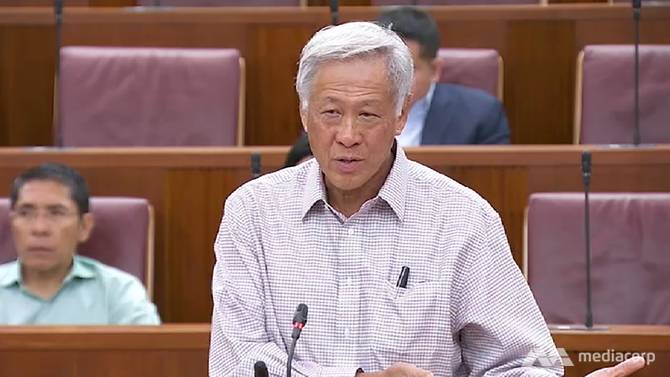SINGAPORE
: Singapore is "quite confident" of being able to detect and neutralise the alleged drones that were used to attack two oil facilities in Saudi Arabia last month, Defence Minister Ng Eng Hen said in Parliament on Monday (Oct 7).
He was responding to a supplementary question by Holland-Bukit Timah GRC Member of Parliament (MP) Christopher de Souza, who had asked if Singapore has the assets to counter attacks by military-grade unmanned aerial vehicles (UAVs) or drones.
Dr Ng said that most militaries, including the Singapore Armed Forces (SAF), are "more confident" when it comes to dealing with "sophisticated" drones.
"Because once you go beyond a certain size, whether it’s manned or unmanned, your air defence systems are up," he told Parliament.
"(For) the Saudi attack, the alleged components that were used or platforms (that) were used, we are quite confident that we would have detected it, as well as been able to neutralise it."
Earlier, in his reply to Mr de Souza’s parliamentary question on lessons that Singapore can learn from the Sep 14 attack on Saudi Arabia’s oil infrastructure and measures that are already in place, Dr Ng said the SAF has ramped up the country’s air defences against drone attacks over the past decade.
These include enhancing the Republic of Singapore Air Force’s (RSAF) early-warning capability with more capable sensors, like the G550 Airborne Early Warning Aircraft and Multi-Mission Radar.
The ground-based air defence systems, which take down drones after identification, have also been upgraded with new platforms, such as the Spyder system and Aster-30 missile system.
“The assets we have in place now would have been able to detect the alleged drones used in the attack on oil facilities in Saudi Arabia,” he said. “The SAF is confident that these systems can protect Singapore against aerial threats from both manned and unmanned aircraft. Our air defence system is live, 24/7.”
Yet, important lessons must be drawn and the SAF is closely monitoring the development of these drone incidents so as to ensure the adequacy of the country’s defense systems, added the minister.
He noted how the recent attack on Saudi Arabia reflected the “growing and evolving capabilities” of drones that are available to both state and non-state actors who mean to do harm.
While reports may be pending confirmation, they showed an increase in the range and manoeuvrability of drones.
Dr Ng said: "Depending on the reports you read, from 700km to 1,500km. These medium and long-range drones are able to avoid radar detection and also hit their targets with great precision."
But the sophisticated, weaponised drones used in the attack on Saudi Arabia only represent "one extreme" of drone capabilities that Singapore needs to guard against, the minister stressed.
The other extreme, according to Dr Ng, refers to the "simple" drones that can be bought in retail stores and modified to avoid detection when intruding restricted airspace.
“Even though they are very simple devices, they can disrupt civilian or military air traffic because they pose safety hazards and the impact is not trivial, as the past incidents in Gatwick and Changi Airport showed.
“In both incidents, planes were diverted (or) grounded which resulted in both real and opportunity costs – mounting to millions – to airport regulators, airlines and passengers," he said.
Sitting in the middle of the spectrum between these two extremes of drone capabilities, Dr Ng pointed out the danger of drones that can carry simple munitions, such as grenades and small arms.
"These threats are rapidly evolving and while they may not cause large-scale damage, can cause bodily harm, undermine confidence and disrupt our society," he said.
“NO SINGLE COUNTER-RESPONSE” AGAINST DRONES
The security threats posed by drones are “real” and the impact can be “damaging, even devastating, depending on the platform used”, he said.
Against this wide spectrum of threats, there can be no single counter-response, he added.
For example, it would “neither be proportionate cost-effective nor sustainable” to employ sophisticated assets worth hundreds of millions to take down hobbyist drones that can be bought for less than a thousand dollars.
Dr Ng noted that these types of drones are better dealt with other tools, including regulations, deterrent fines and penalties, education, and working with relevant stakeholders such as drone-hobbyist communities.
When it comes to drones that sit in the middle of the threat spectrum, the SAF puts up additional sensors and counter-offensive capabilities when required during high-signature events, such as the National Day Parade or the Trump-Kim Summit, or when intelligence assessments indicate specific risks.
Other agencies also take on specific responsibilities. For instance, the Ministry of Transport and the Civil Aviation Authority of Singapore deal with possible drone intrusions at Changi Airport.
The Ministry of Home Affairs and the Singapore Police Force take the lead in defending against drones in specific areas of security concern and during major events. The SAF will assist them when called upon and when needed, said Dr Ng.
The SAF remains responsible for drone attacks against Singapore by would-be aggressors, especially towards key installations.
Said the Defence Minister: "The SAF will continue to monitor threat developments and learn from all incidents that occur globally to provide appropriate responses to the spectrum of potential drone attacks that are commensurate with the level of threat, sustainable and cost-effective."
Read more at
https://www.channelnewsasia.com/new...t-neutralise-drones-saudi-arabia-uav-11976108



